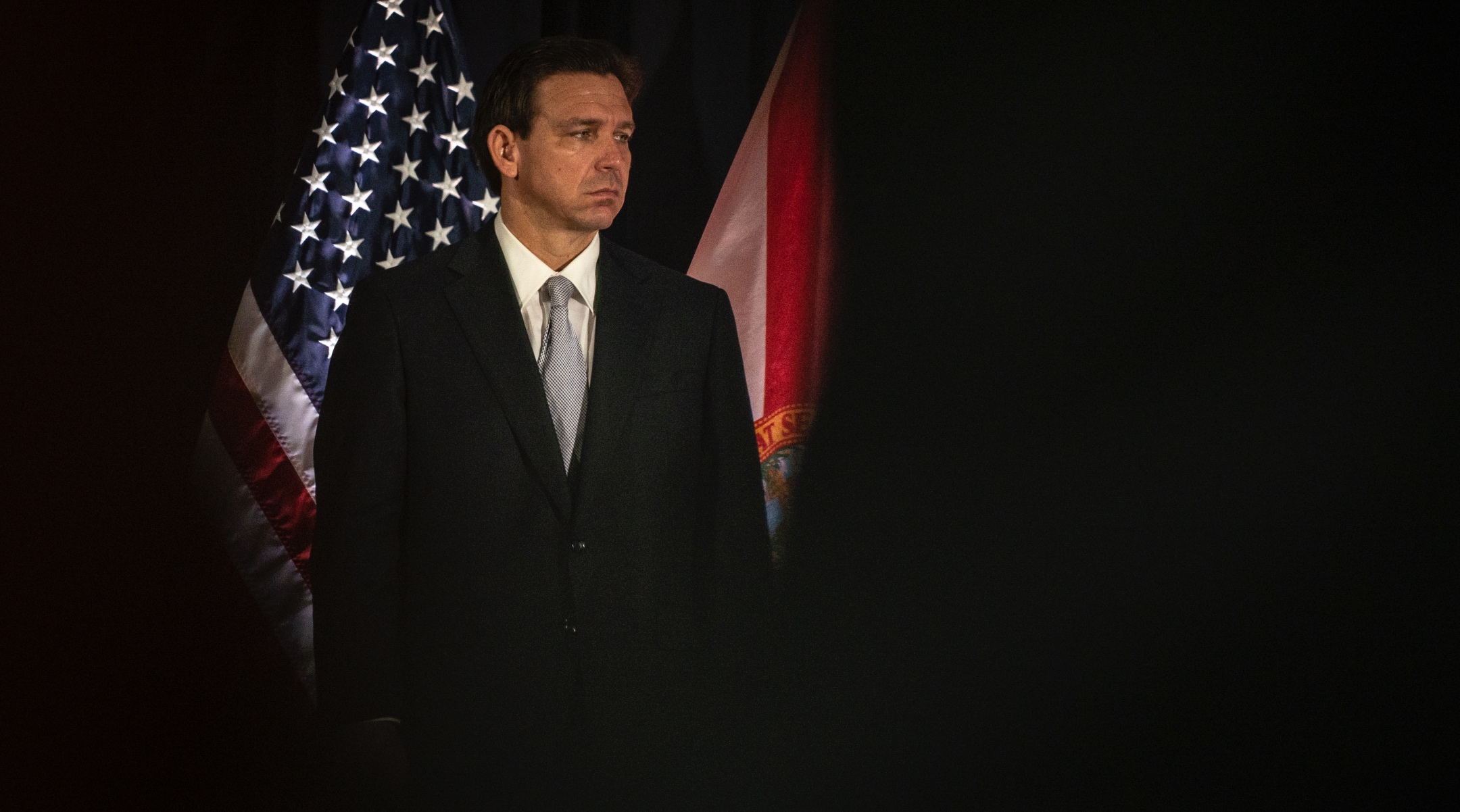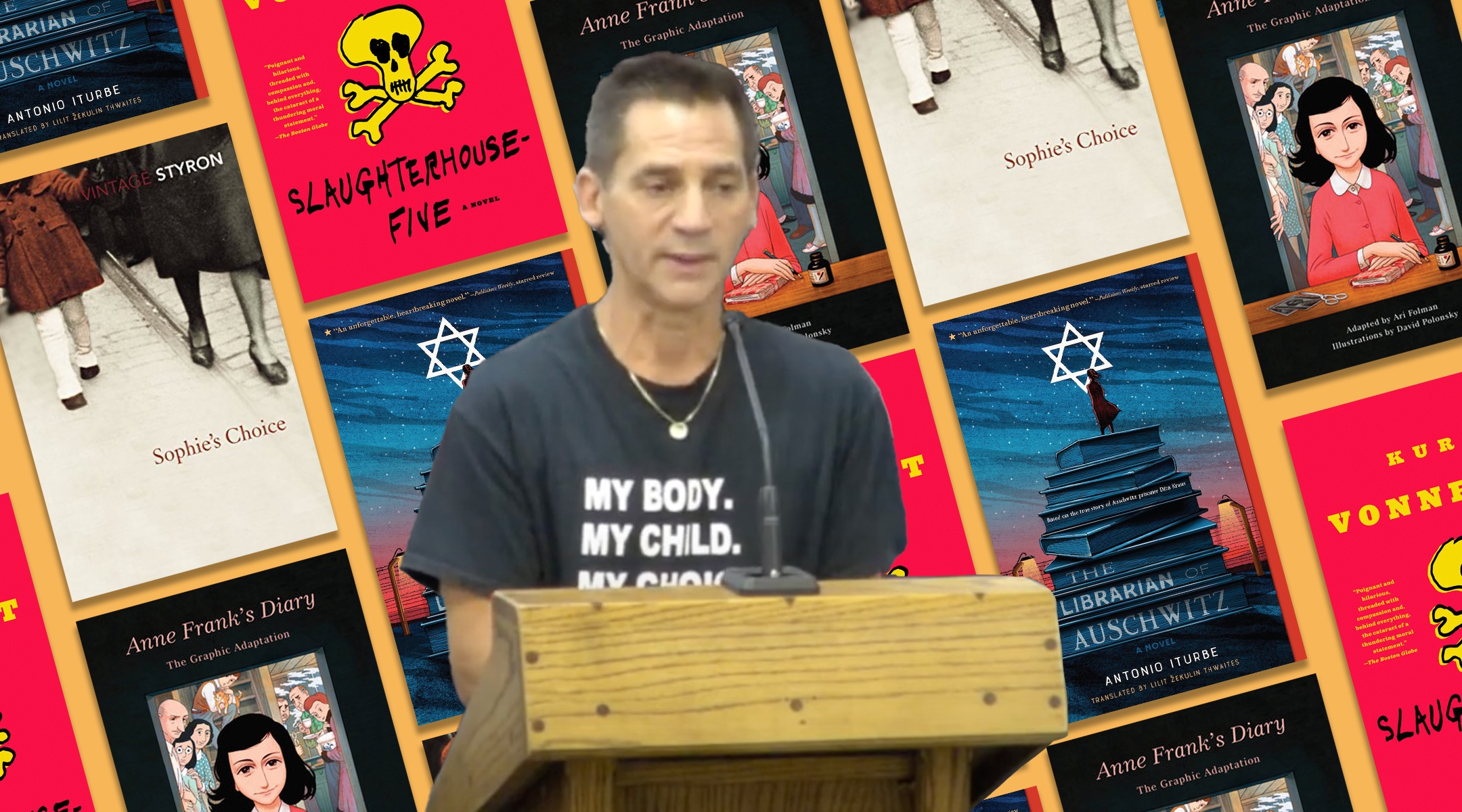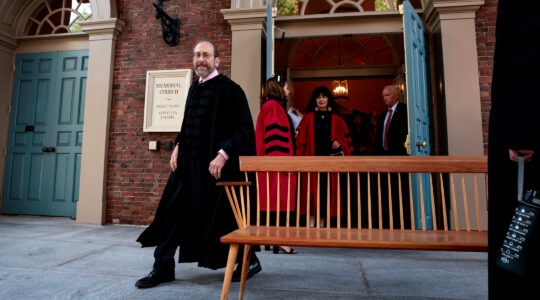(JTA) – After two years of Florida schools making headlines for pulling Anne Frank’s diary, “Schindler’s List,” Saul Bellow novels and other Jewish books, Ron DeSantis has conceded that his state’s book challenge policy has gone too far.
DeSantis, the governor and former Republican presidential candidate, pinned the blame not on the policy itself but on activists who he said have made excessive use of the regulations.
“Although we like people wanting to be involved in what’s going on, to just show up and object to every single book under the sun, that is not an appropriate situation here and we’ve seen that occasionally,” he said during a press conference Thursday where he announced his intent to “prevent abuses in the objection process and ensure that districts aren’t overwhelmed by frivolous challenges.”
It was an abrupt about-face for DeSantis, who had staked much of his national reputation on being a conservative culture warrior and cultivated the growth of active book-challenge groups such as Moms For Liberty in his state.
High on his list of suggestions is a plan to fine individuals who challenge more than a certain number of books. The governor endorsed a proposed law that would let districts impose a $100 fee on parents who object to more than five books. He also stated that people without children in the district shouldn’t be filing an abundance of challenges.
Under this plan, one parent in particular could be hit with more fines than any other: Bruce Friedman, a Jewish father in the Jacksonville area who has become a national symbol of the book-ban movement.
Friedman has filed challenges against hundreds of books in his public school district that he says are inappropriate for students, making him the most frequent book challenger in the state — and possibly the most prolific in the country. He has pushed his school to pull “Anne Frank’s Diary: The Graphic Adaptation,” claiming a small illustration of Anne’s recounting of same-sex attraction made it inappropriate for children.
He has also challenged books including the young-adult Holocaust novel “The Librarian of Auschwitz” and the middle-grade novel “Get a Grip, Vivy Cohen,” about an autistic Jewish girl and her gay best friend. While the district agreed to pull “Anne Frank’s Diary,” both of the latter books were restored to shelves after Friedman’s district found nothing wrong with them.
But he says he isn’t scared of the policy change.
“They think the fee will stop me. That’s funny,” he told the Miami Herald, arguing that state lawmakers were the ones to blame for his flurry of challenges because they failed to clearly define the terms of their initial law restricting content in schools.
Friedman elaborated on his position in an email to the Jewish Telegraphic Agency.
“The only thing that will stop me, other than G-d, is if my district creates a community approved guideline and rubric and institutes action including a modicum of discernment,” he wrote Tuesday.

Florida Gov. Ron DeSantis listens to other speakers before signing a series of education bills at Cambridge Christian school in Tampa, Florida, May 17, 2023. (Thomas Simonetti for The Washington Post via Getty Images)
Friedman proudly noted that more than 300 books have been permanently removed from the district “as a result of my diligent and stubborn efforts,” and that he has submitted 160 challenges in the last four months, adding, “Some of these may or may not have been written about, or written by, Jews. I do not feel this is important at all.”
In his view, all of the titles he’s challenged were “pornographic.”
He gave the example of “Sophie’s Choice”, William Styron’s best-selling 1979 novel about a Holocaust survivor that contains sexual content, which Friedman successfully pushed his school to remove. “You just can’t leave it laying around innocent children in public school here,” Friedman wrote.
Beyond Friedman, Florida’s laws have made it easy for a number of right-wing activists to file book challenges, and the vagueness of the law has led some districts to preemptively empty their collections or wall off their entire libraries (which has in turn induced some teachers to resign). One district put a diversity-themed collection of books, including a picture book about making cholent on Shabbat, in “review” for more than a year before returning the titles to shelves.
The literary free-expression group PEN America, publishing giant Penguin Random House and several bestselling authors have brought a lawsuit against one such district in the Panhandle, which removed Frank’s original diary, “Schindler’s List” and “The Librarian of Auschwitz” from its shelves alongside 1,600 other titles including the dictionary.
The vast majority of challenged and pulled books, both in the state and nationwide, involve gender, sexuality and race. Most of Friedman’s own challenges also tie into similar objections. For example, his November 2023 challenge form for “Get a Grip, Vivy Cohen,” by Sarah Kapit, objects to a scene in which a gay character comes out to his parents.
“Stop shoving alternative sexualities at children!” he wrote on his form objecting to the book, which has been distributed elsewhere by the Jewish nonprofit PJ Library, which sends free Jewish-themed books to children. He included passages from the book that he found objectionable, along with his own notes in the margins: “Gay boyfriend — whatever.” At another point he objects to a character’s comment that “our rabbi is married to another woman,” writing in the margins a list of words on the page he finds objectionable: “Gay/Gay/Bigots/Gay/Married Woman (incl. Rabbi)/Bigoted/Bigots.” (Friedman’s challenge form for “The Librarian of Auschwitz,” by contrast, states, “Unsupervised forays into the horrors of the Holocaust can be traumatizing for children.”)
Parents and Moms For Liberty activists in other Florida districts have successfully pushed schools to remove the Anne Frank illustrated diary as well as a Jodi Picoult novel about the Holocaust. One of those parents has since appeared on an antisemitic livestream, but later said she didn’t know about the host’s history of antisemitic remarks.
Nationwide, restrictive book policies in both schools and public libraries remain in place in several states. This month, the board of a public library in Prattville, Alabama, outside Montgomery, said it was suspending the purchase of any children’s or young adult books containing “obscenity, sexual conduct, sexual intercourse, sexual orientation, gender identity, or gender discordance.”
Friedman told JTA he doesn’t care if the governor is pulling back on his movement; he’s in it for the long haul.
“At some point, librarians and principals will tire of me including their names in my publicly available reports — when I uncover porn,” he wrote. “Maybe they’ll begin to do the right thing (weed the prurient and age-inappropriate rubbish) for the wrong reasons. Works for me.”
JTA has documented Jewish history in real-time for over a century. Keep our journalism strong by joining us in supporting independent, award-winning reporting.






